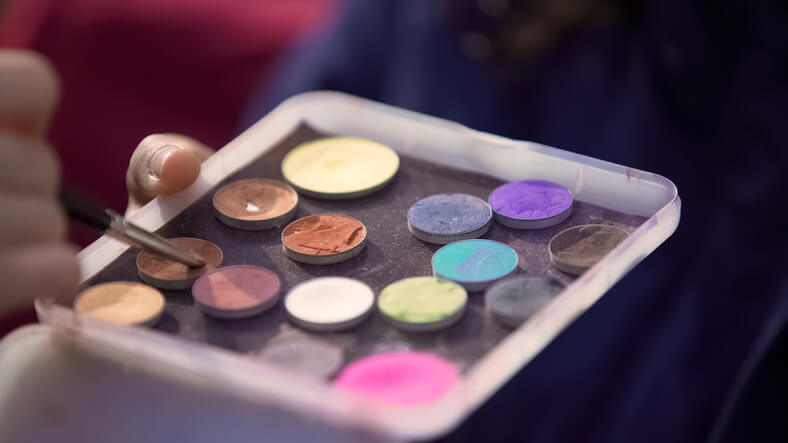We all want to protect our bodies from harmful chemicals. Organic, non-GMO, and other labels starting showing up everywhere in recent years. Emerging science shows us that the things we eat, inhale, and put into our bodies really do matter. Our makeup, however — something we rub on our faces and bodies — gets much less attention. But maybe it’s time to change all that. Talc, a clay mineral mined from the Earth, is the number-one ingredient in many makeup brands. And while it seems harmless — after all, talcum powder’s also called baby powder — it’s not. Talc naturally forms right next to asbestos, a known carcinogen.
Talcum powder is currently under fire from ovarian and lung cancer victims. However, the FDA doesn’t regulate talc like you might expect — especially when it comes to cosmetics.
December 2017 Makeup Recall Triggers Asbestos Scare for Parents
Parents were horrified in December 2017 when Claire’s recalled some cosmetics marketed to children. It happened after a concerned mother sent her six-year-old daughter’s makeup to a lab for testing. The makeup allegedly tested positive for tremolite asbestos — which can cause mesothelioma and other cancers. Claire’s pulled the products off their shelves in response.
The FDA regulates talc like it does all cosmetics sold to U.S. consumers. Still, the FDA only regulates talcum as a cosmetic ingredient. That means unlike our food and medications, the FDA doesn’t test talc for safety or actually approve it. Instead, they expect companies that manufacture cosmetics to test their products for asbestos before they hit shelves. In other words, what happened with Claire’s could affect any cosmetics company that isn’t careful enough.
Inhaled Talcum Powder Can Easily Damage Lungs
Many people rub products with talc on their bodies and faces every day. Not only is it the most common eyeshadow ingredient, but it’s also in most powder-based makeups and body powders.
Because so many different products contain talc, studying its link to cancer is complex. But scientific research since the early 1990s shows talc inhalation can cause lung cancer. Some talc risk comes from its close proximity to asbestos, since they’re mined right next to each other. And while manufacturers say they make efforts to remove asbestos from products, recent court rulings show it isn’t always effective.
Ovarian Cancer Plaintiffs Win $2.12 Billion Talcum Powder Settlement
The Claire’s cosmetic scare has the makeup industry worried about talc in cosmetics. Still, many victims are suing talcum powder’s biggest distributor, Johnson & Johnson, and winning multimillion-dollar awards. But they’re not suing over makeup — these lawsuits say J&J’s talcum products caused ovarian cancer.
In May 2020, the company’s talcum supplier, Imerys Talc, agreed to file bankruptcy and sell off its North American holdings. The company plans to use this money to resolve over 14,000 talcum powder cancer claims. And in June 2020, a Missouri appeals court upheld a talcum powder cancer verdict awarding 22 plaintiffs $2.12 billion in damages.
Studies Show Using Talc Near Genitals Increases Cancer Risk 33%
One 2003 meta-analysis found regular talcum powder use increased women’s ovarian cancer risk by 33%. If talc can inflame a woman’s ovaries, should we keep rubbing it on our eyelids, faces and babies’ bottoms? Without increased FDA talcum regulation and safety testing in place, it’s worth a second thought.
If you or a loved one inhaled talc and developed mesothelioma, you may qualify for compensation. And if you developed ovarian cancer after regular talc use, you may also have a claim. To see if you may qualify for a significant cash settlement, complete your free talc claim evaluation today. After answering three brief questions, you’ll see your evaluation results online immediately. After submitting your information, an experienced lawyer will call to discuss how to get the compensation and justice you deserve.
Related: Mesothelioma Lawsuit Blames J&J’s Talc Products
Mandy Voisin
Mandy Voisin is a freelance writer, blogger, and author of Girls of the Ocean and Star of Deliverance. As an accomplished content marketing consultant, mom of four and doctor's wife, Mandy has written hundreds of articles about dangerous drugs and medical devices, medical issues that impact disabled Americans, veterans' healthcare and workers' compensation issues since 2016.

